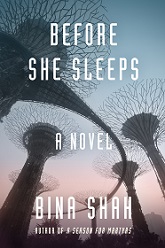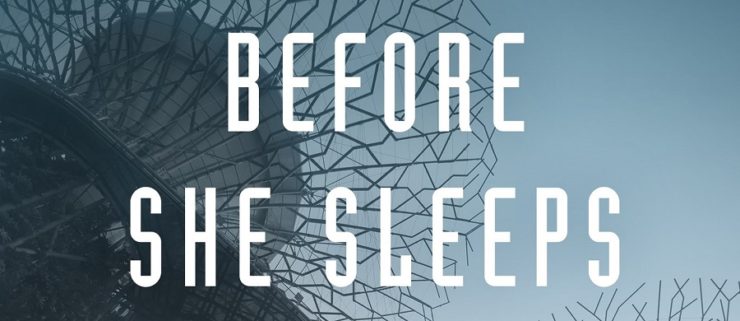After nuclear war and global instability, Green City seems like a utopia, a place of hope and growth in the middle of a vast Southwest Asian desert. When a Virus decimates the female population, the Agency creates Perpetuation Bureau to repopulate the region. Men hold all the power, but must share a Wife with up to five other men. Women are stripped of their rights and made into “domestic scientists” whose sole purpose is to breed with their Husbands. The Bureau assigns marriages, monitors women’s fertility, and executes anyone who resists.
Not long after the establishment of this patriarchal authoritarianism, two women disappear from Green City. In its underground tunnels they build the Panah, a secret community of women who refuse to be Wives. They survive through a kind of prostitution, offering powerful men not duty-bound sex but chaste intimacy. Sabine hates working with Clients and carries so much fear of being assaulted by them that she barely sleeps. On her way home from a Client she passes out on the street in severe pain and ends up in the hospital. Lin, the woman who runs the Panah, begs for help from Reuben Faro, a high-ranking man in the Agency who also happens to be her lover. A kindly male doctor keeps Sabine alive, but the longer she stays in the hospital, the more precarious her situation—and the future of the Panah—becomes.
Dystopian fiction is a funhouse mirror held up to the present. It distorts our world just enough to exaggerate the differences, but not so much that it loses familiarity. In it we see how our society’s actions can contradict our values. There’s a reason the subgenre surges in popularity during periods of sociocultural turmoil. When done right, dystopian fiction reveals the chasm between who we say we are and who we really are by warning us of what we are about to become. When done poorly, it becomes a weak parable that neither pushes the conversation forward nor demands accountability. I want to tell you that Before She Sleeps by Bina Shah is well-crafted feminist dystopian science fiction. In many ways it is. But it fails for me in two key areas: queerness and authorial intent.
Buy the Book


Before She Sleeps
There’s something to be said for a feminist dystopian novel using queerness and the gender binary to talk about the evils of the patriarchy. This is not one of those novels. Before She Sleeps is deeply, frustratingly, and inexplicably focused on cisnormativity and heteronormativity. The characters do not refute, scrutinize, or criticize how Green City constructs gender roles, identities, or expressions. They clearly don’t enjoy life under authoritarian rule, but that’s about it. Although the characters chafe at Green City’s gender roles, they’re really more upset about how those roles are enforced than how the roles are defined.
The novel posits cishet as the default human experience and everything not that as violent, deviant behavior. This is disingenuous at best, dangerous at worst. Thing is, you simply cannot meaningfully critique the patriarchy when the only viewpoints considered are cisgender heterosexuals. Not in this day and age. Shah is, in effect, only looking at a fraction of the problem. I’d argue that a non-cishet perspective is actually a better lens for analyzing the patriarchy. People who aren’t cisgender, heterosexual, or both have substantially more to lose in a patriarchal society than those who are. Frankly, I think it’s a shame Sabine was written as cishet. Her storyline would have had so much more social commentary with some queerness folded in. But Shah still could have used the background narrative to venture beyond the rigid rules of cis/heteronormativity even while keeping the protagonists cishet.
The absence of QTPOC narratives also begs a host of worldbuilding-related questions. What about the Virus that can be transmitted by men but kills only women? Gender is a social construct that exists on a wide, messy spectrum. You can’t apply gender stereotypes to diseases. And what happened to all the queer people when the new regime took over? Did they escape before the borders were sealed or did they go into hiding? Were trans people forced to detransition or were they executed? Did non-binary, genderqueer, and intersex people have to pick a binary expression, was the decision made for them by the government, or were they eliminated altogether? What about the queer men in power? Was the Panah open to trans or queer women? That by the end of the novel I know more about Green City’s malls than I do its queer community is disappointing to say the least.
Shah intended Before She Sleeps as “a paean to women’s resourcefulness, the importance of male allies and friends, and faith that we can redress the imbalances of our societies.” While the novel somewhat succeeds at the first two, it neglects the third. The Panah is not a counterbalance to the Agency. Its founders sought refuge from Green City’s demands on womanhood, not to undermine the Agency’s control. They may not like the society they live in, but none of the characters, male or female, seem to have any interest in dismantling the system.
As for the resourcefulness of women and the importance of male allyship, well, the novel binds the former to the latter. The resourcefulness of the women of the Panah comes solely from finding ways to make men need them. Men still hold all the power, they just wield it differently. Sabine, Rupa, and the other “rebellious” women hold as little personal agency in the Panah as they do in Green City. Men request their presence and the women go without resistance or hesitation. Men set the tone of the meeting, control ingress and egress, and can abuse their contracts with no oversight. Male allyship (or lack thereof) turns the plot, not the women’s resourcefulness. In other words, the women of the Panah are codependent, not independent.
A lot of people are going to love this novel no matter my objections. It will appear on lists of the best feminist and dystopian fiction for years to come. And maybe it should. Although the overarching context of Before She Sleeps didn’t work for me, I was still captivated by Bina Shah. She concocted a moving tale about a frightening future that could all too easily come to pass. As much as I was concerned by what Shah left out, what was on the page was beautifully written.
The novel is broken into three parts, and each chapter is told from different POVs. Sabine is the main protagonist and gets the most first-person narration, but other voices filter through to offer different takes on the proceedings. The main characters are well-written and emotionally raw, Sabine in particular. Character details are sparsely and delicately delivered, but I never felt lost or confused. The worldbuilding is largely excellent (with exception to the queer questions noted earlier). Everything from the tech to the sociopolitical rules to the literal landscape are vividly drawn.
Besides Shah’s obvious talent, I can’t think of another feminist dystopian science fiction novel set in Southwest Asia. The background mythology is decidedly not European or Christian, a welcome change to the subgenre’s usual fare. The novel’s premise alone is fascinating enough to merit a read through. I just wish Shah did more with it.
Ultimately, I can’t decide if I’m more disappointed for Before She Sleeps not being what I wanted it to be or for not being what it could have been. Yet by rejecting queerness, a novel that by all rights should be the new A Handmaid’s Tale instead becomes a shadow of Atwood’s seminal work. And I think that’s what bothers me most of all. We’re long past due for the next great feminist dystopian science fiction novel. Bina Shah comes close, but stumbles where it counts.
Alex Brown is a YA librarian by day, local historian by night, pop culture critic/reviewer by passion, and an ace/aro Black woman all the time. Keep up with her every move on Twitter, check out her endless barrage of cute rat pics on Instagram, or follow along with her reading adventures on her blog.










